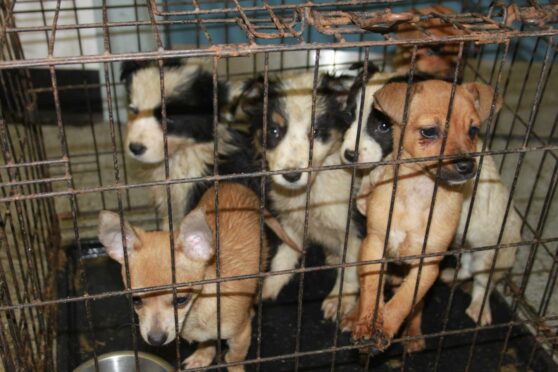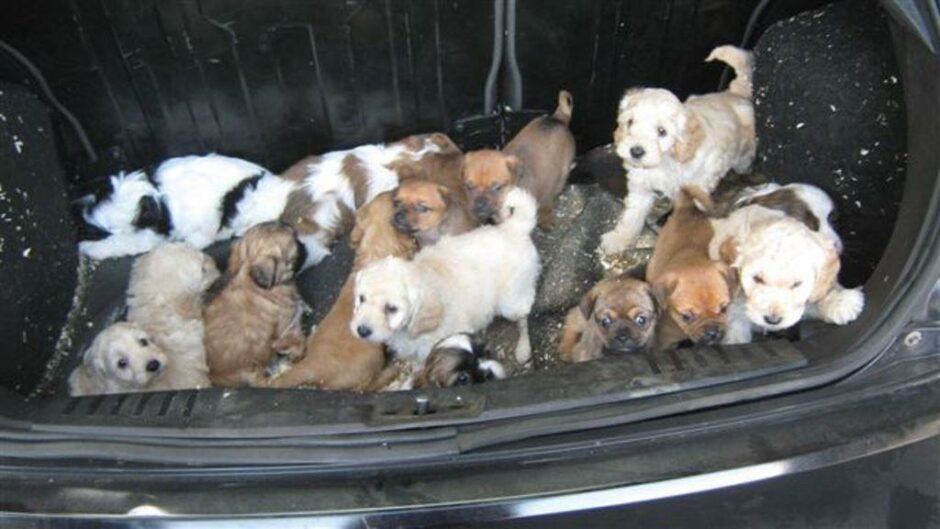Criminal gangs are renting Airbnbs in the north and north-east to sell seriously ill puppies to unsuspecting animal lovers.
The Scottish Society for Prevention of Cruelty to Animals (SSPCA) says the pandemic has fuelled a huge rise in demand for puppies and, in turn, the illegal trade.
Inspectors from the charity have been working around the clock to smash the network of illegal breeders and dealers, who they say have no concern about the death and cruelty they are causing.
In an effort to look like legitimate sellers, the criminals are renting properties to dupe unsuspecting buyers, the Scottish SPCA said.
Problem rife in Aberdeen
Irish crime gangs are believed to be fuelling the spike in poorly puppies being sold in Scotland, amid a nearly 40% increase in welfare calls.
And with these criminals getting more devious, it’s testing for the small team of animal inspectors to the limit.
Undercover inspectors have discovered puppy farm gangsters using rented flats or homes in Aberdeen this year.
One of the team – who spoke to us on the condition of anonymity – said: “Sometimes they’ll use an Airbnb as a fake address to give to buyers, but other times they’ll actually rent it for a couple of nights because that £100 is a drop in the ocean compared to what they make.
“We’ve even had one rent an actual house in Aberdeen. It was a lovely place and when we raided it the neighbours were horrified at what was taking place there.
“But these people are making thousands of pounds a week, so to rent a home in Aberdeen to sell from and appear trustworthy is absolutely nothing to them.
“Airbnb works really hard with us to crack down on them. These people will always find a way, though.”
Huge rise in callouts
Between January 1 and October 31 this year the charity received 1,059 calls regarding puppy breeding – a 34% increase on the 702 made last year.
“We have had people buy a pup and it’s dead four hours later,” the inspector told us.
“We seized 150 pups from bad dealers in Scotland last year and loads of them didn’t make it.”
She said pups are being shipped in their hundreds on a daily basis from Northern Ireland, sometimes ripped from their mums after just four or five days and more often than not absent of any vaccinations to keep them healthy.
“If you commit the crime of selling pups you are, as a general rule, not going to jail,” the SSPCA inspector said. “If you are it’s for nine to 10 months, tops.
“It’s a multi-million-pound industry. You can get five years in prison for animal cruelty crimes now, and that used to be one year. But even getting these people to court and catching them is really difficult.
“Unless we find them with the dogs in the place where they are staying it’s really difficult.”
How do we end illegal puppy farms?
The key to ending the vicious cycle lies, the charity says, with buyers.
“Buyers tell us they just couldn’t leave the pup and had to take it home even if their gut was telling them the dealer was dodgy,” the inspector added.
“But they are not thinking about the mums stuck in a box with bad health conditions, infected eyes, illnesses because they have been over-bred and just waiting to die.
“You are handing that money ower to a criminal who is not paying tax and is selling you a pup that is going to die.
“It’s down to the buyer to be aware and to know the background.
“We do our best and we will have crackdowns, as we did in Aberdeen earlier this year, but to go through phases where it’s just constantly pups dying is quite draining.
“What the answer? The public need to stop buying from these people.”
Illegal traders making ‘crazy money’
Bolstered by pups going for “ridiculous prices” the SSPCA is seeing dodgy breeders selling pups they buy for £50 for as much as £3,000.
“Pre-pandemic a ridiculous price to pay for a cross-breed Cockapoo was £950 … now people will pay £2,800.
“They’re the most popular breed in the country. People will pay £1,400 for a cross-bred wee Jack Russell now.
“Cross-breeds are a trend now and that means illegal sellers will breed anything and sell it under that guise.”
When once people would pay £600 for a labrador, that figure is now around £2,000. Pomeranian breeds, meanwhile, now go for as much as £1,800 as opposed to £300 to £400 previously.
Bulldogs are one of the most expensive breeds now, with buyers paying anywhere between £3,000 and £4,000. Cane Corsos go for around £2,500 and pre-order pugs cost more than £2,000 nowadays, double what people would have paid two years ago.
“A breeder or a dealer will charge what people are willing to pay,” the inspector added.
“What’s basically happened is that prices have shot up by three and people are charging astronomical prices because there’s the demand.”
‘They will be vomiting live worms’
As humans dealt with wave-upon-wave of coronavirus infections, SSPCA officers have seen an ongoing rise of pups with canine parvovirus or worm burdens.
The contagious virus, commonly known as parvo, has a mortality rate of 91% in untreated cases and should usually be vaccinated against from six weeks old.
“People go on Gumtree, pay crazy money and three days later they have a dead pup on their hands,” the inspector added.
“Some have a worm burden, which shouldn’t kill a pup but some have it so bad they can’t take in water.
“They will be vomiting live worms.”
‘It’s like they’re being eaten from the inside out’
Parvo, meanwhile, leaves pups with “no chance at life” if they’re ripped away from their mums too early and without the three-dose vaccine required to prevent it.
“Within a day or two of catching it they are really ill and they just can’t survive it,” she added. “At the lower end of the scale, if they are seen by a vet, the mortality rate is 80%. If they’re not treated it’s 96%.
“Some end up being euthanised because they are so ill. It’s almost like they are being eaten from the inside out.”
“They just hadn’t had a chance at life.
“We’ve organised gangs in Ireland who are part of the travelling community and they bring them over in their hundreds every week and sell them even if they’re sick.
“It’s devastating for the families that bought a pup only for it to die hours or days later.”
The charity’s #KeepMeOffYourXmasList campaign has more information about the suffering caused by buying from low-welfare breeders.
Airbnb is now offering neighbours of properties the ability to contact them with concerns via www.airbnb.co.uk/neighbours
Anyone with concerns about a property they believe to be listed on Airbnb can report this through the company’s Neighbour Support Line.
Patrick Robinson, director of public policy at Airbnb, said: “We thank the Scottish SPCA for their vital investigative work on this issue.
“We want to ensure justice is served and welcome the opportunity to support the SSPCA on their investigations.
“The vast majority of hosts and guests are good neighbours who follow the rules, and we take swift and robust action against anyone who doesn’t live up to the standards that communities expect.”


